HOME >> CHINA
Xinjiang on high alert for security threats during Ramadan
By Bai Tiantian in Urumqi Source:Global Times Published: 2016/6/26 22:03:00
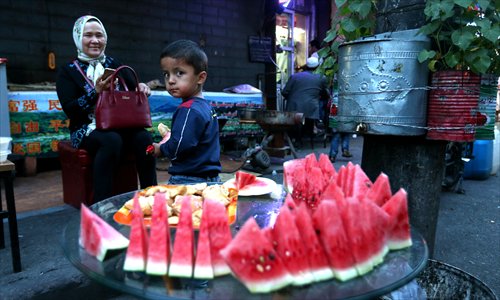
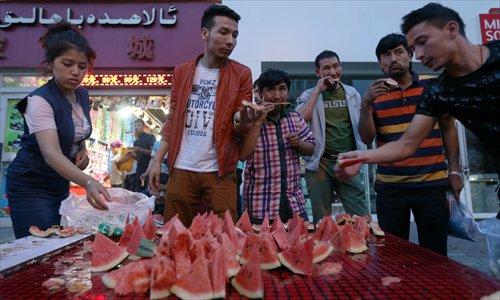
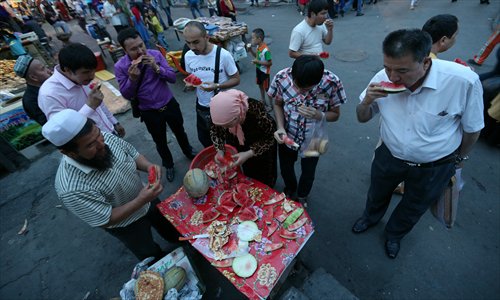
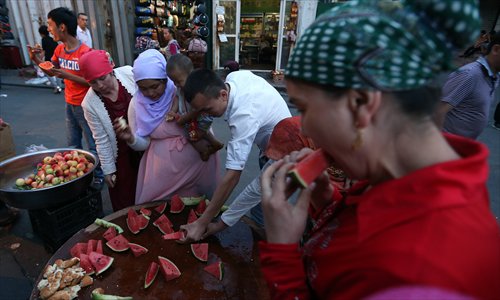
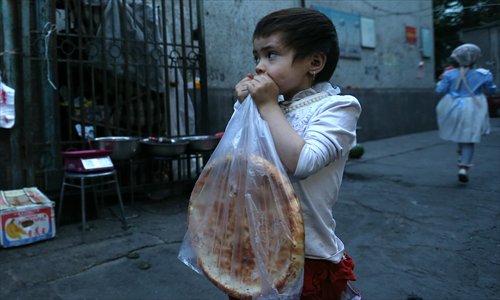
Muslims break their daily fast at a free fruit stand during the holy month of Ramadan in Urumqi, Northwest China's Xinjiang Uyghur Autonomous Region on June 24. Photo: Cui Meng/GT
At 9:57 pm Beijing time Friday, the Baida Mosque, or the Grand White Mosque, in downtown Urumqi looked serene.
It was three weeks into the Islamic holy month of Ramadan and a day's fast was about to end. The sun had just set. The sky was clear blue, pale in the west and dark above.
The exterior wall of the Baida Mosque is white, as its name suggests, with two towers standing at each side of the main architecture and a crescent sitting on top of its green dome.
Not far from the mosque, food stands were set up to provide free watermelon slices to devotees after they break the fast every day.
After a day of fasting, Muslims were gathering for their first meal at the mosque. The gate remained wide open during the gathering. While women are not allowed to set foot in the mosque, I could see from across the street that a few people were still on their knees praying.
Five times every day, devout Muslims swarm into the mosque and chant passages from the Koran. Sometimes the chanting can be heard on the street as one walks by.
Hot market
In an ice-cream shop across the street from the Baida Mosque, Abdul Abdulpatel, 43, was sitting behind the counter at his empty shop, waiting for the day's fasting to come to an end so that customers can finally visit the shop for a cool bite.
During the month, he extended his business hours to 1 am to better suit his customers' schedule.
"July is always the busiest. A lot of travelers come [to Urumqi] and the weather is hot. After September, fewer customers," Abdul said.
Abdul feeds his family, including three kids, with his shop Avral Ice Creams. The ice-cream recipes were handed down to him by his grandfather, who started selling ice cream some 60 years ago in Ili, western Xinjiang. The family business later expanded, with Abdul running a shop in Urumqi, the regional capital, and a brother running another in Hotan, a city in southern Xinjiang.
Abdul is a devoted Muslim and therefore refrains from eating or drinking in the daytime during Ramadan.
Every day he gets up early to prepare for work and goes to bed late. He said that after all these years he has grown used to the hard work.
"Someday I might open a shop in Beijing," he said.
Unlike Abdul, Bosman, 25, said his fruit-selling business flourishes during the Ramadan.
"People tend to eat more fruit after a day's fasting. So I make more money," Bosman said.
Bosman had been helping his father with vendor since he was 10. Five to six years ago, he took over the business as his father decided it was time for him to retire.
His vendor is about 500 meters away from a mosque. On Friday, the day of Jummah, he left his vendor several times to pray in the mosque.
"Every time I leave my cart unattended. No one has ever tried to steal from me," Bosman said.
Unhappy anniversary
Ramadan is widely observed by ethnic minorities in China, including the Hui, Uyghur, Kazakh, Uzbek, Tajik and Kyrgyz. China has about 20 million Muslims.
As most Muslims fast during Ramadan, authorities imposed an exception to Party members, civil servants and underage students.
Police officers, in particular, are told not to fast as refraining from eating and drinking would severely interrupt their abilities to carry out their duties.
Alim (pseudonym), a Uyghur police officer in Urumqi, said he has to stay on duty the entire month of the Ramadan.
Alim, who spoke on condition of anonymity, said the content of his work does not change much in the holy month but his squad was told to stay on alert to "watch out for any possible accident."
In July 2014, Jume Tahir, 74, then imam of the Id Kah Mosque in Kashgar, southern Xinjiang, was stabbed to death by extremists after he led early morning prayers.
His death came two days after dozens of terrorists killed 37 civilians in a series of attacks at the local government office and police stations on July 28, 2014, the last day of the holy month that year, in Shache county, Xinjiang.
What might also unnerve the authorities this year is that Ramadan ends on July 6, a day after the anniversary of the Urumqi riots that took place on July 5, 2009.
The riots, together with a series of other terror attacks in 2014, have had a significant impact on ethnic relations and government policies.
Even though the city of Urumqi is modern with high rises and luxury shopping malls, there are little things that reveal the underlying tensions.
Accompanying every bus stop in downtown Urumqi, there is a police booth where security guards or auxiliary police officers are constantly on duty. Armored tanks can be seen parked by the side of Renmin Square, which is close to the Xinjiang government compound.
Patriotic advertisements stand throughout Urumqi as in every other Chinese city but some of the boards' slogans are different.
One advertisement board read that the Urumqi government is working on de-radicalization among minors, including setting up after-school programs that help children focus more on educational activities.
On a bus stop sunshade, advertisements for a dermatological hospital are printed on the left and slogans that say "Unity and stability lead to happiness" are printed on the right.
As I wrapped up a day's work and took a taxi to my hotel, the taxi driver politely told me to sit in the back seat.
"It's a government regulation. After 10 pm, no one, male or female, is allowed to sit in the front seat by the side of a taxi driver," he said, adding that it is to prevent robbery.
I quietly obeyed.
Newspaper headline: Fast Awake
Posted in: Society